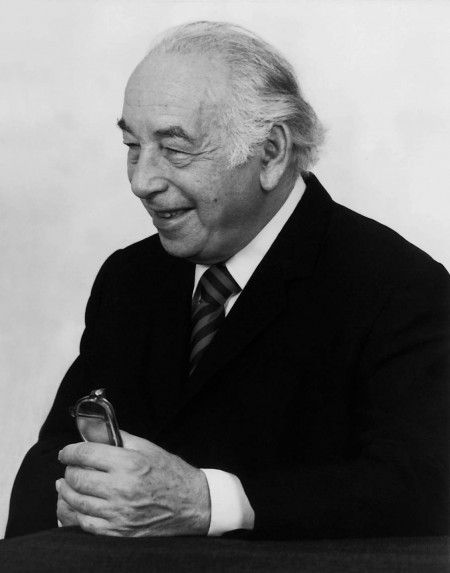
25 June 1907, Budapest – 20 May 1988, Genf
He was a student of Kodály in composition at the Academy of Music (1930-1935). He made his debut as a conductor with great success before World War II. He was one among the musician personalities who made the greatest impact on the rebirth and revival of the post-1945 Hungarian cultural life. He reorganized the Székesfővárosi Zenekar [Orchestra of the Capital] in January already in 1945 and conducted the first concerts at the destroyed, starving side of Pest in the Hungarian Theatre – while the fight was still continuing at Buda. He conducted at 724 (!) occasions in Hungary until his leave in 1956. He conducted 439 works of 138 composers in Budapest and other rural towns with Hungarian and international artists (Menuhin, Oistrakh, Jeanne-Marie Darré, Tito Schipa etc.). He frequently conducted abroad, as well – at 94 occasions in 11 years (in Austria, Czechoslovakia, Yugoslavia, GDR, Italy, Romania and the Soviet Union).
He took part in the conducting master class of Hermann Scherchen in Brussels in 1938 which was determinative for his further career. He worked out the plan of a uniquely conceptualized conducting school based on his experience and the textbook of Scherchen. He took leadership of the conductors' training at the Academy from János Ferencsik in 1949. The ‘Somogyi-method' applied at the Academy was a great and inspired development of a pedagogy grounded by Scherchen. A row of outstanding students were raised at that school.
Many pupils of the famous Hungarian conductor-school studied with him – e.g. Gyula Borbély, Tamás Breitner, István Kertész, Gábor Litván, Ervin Lukács, Géza Oberfrank, István Párkai, János Sándor, Albert Simon and Frigyes Hidas, Melinda Kistétényi, Kamilló Lendvay, László Lukin and others. Besides them, he had a number of students working abroad today, including Péter Erős (USA), János Kőmíves and Jenő Rehák (France), János Kulka and Tamás Ungár (Germany) and such private students as György Lehel and János Králik.
His leave in 1956 was an irreplaceable loss of the Hungarian musical life. The extraordinarily demanding, thorough, conscientious musician left a vacuum, perceptible for a long time. Somogyi purposefully worked for a high level orchestral culture. He was never satisfied with the ‘everyday' rehearsals, the simple repeating of the works. He expected his orchestral musicians to play with full devotion and perfection. His superior knowledge of the works, the exceptional sense for style, refined hearing and uncompromising conscientiousness inspired his musicians for a more beautiful and precise playing.
His work with symphonic orchestras, primarily with the Székesfővárosi Zenekar [Orchestra of the Capital] and the Radio Orchestra was an achievement of a typical orchestra-builder conductor. The result of that revealed itself in the performing culture of the Hungarian orchestras already at that time and later, as well.
He knew each note, voice and entry of the countless works he conducted, because of his thoroughness and exceptional diligence. He expected, furthermore required his students to acquire the pieces they brought to lessons at the highest possible level. They had to be able to perform the symphonic works - on three pianos - at the lessons.
The teaching method of László Somogyi was fairly rich and versatile. An important element of his pedagogy was that he frequently invited his students to observe his rehearsals at the Radio which they evaluated afterwards. He considered significant that his conducting candidates should have continuous connection with an orchestra. Therefore he developed a system that the MÁV orchestra, the Radio orchestra and occasionally the State Concert Orchestra visited the Academy of Music so that his students could conduct good orchestras besides their lessons with piano.
László Somogyi was a dedicated propagator of older and newer Hungarian music.
He served the aim that Hungarian music should be performed more often, the more better and nicer with all his power and knowledge.
Professor Dénes Bartha once said at classroom No. 18: ‘Today's class is cancelled. We go downstairs to the Great Hall – Somogyi is rehearsing Bartók.'
Kerekes István


